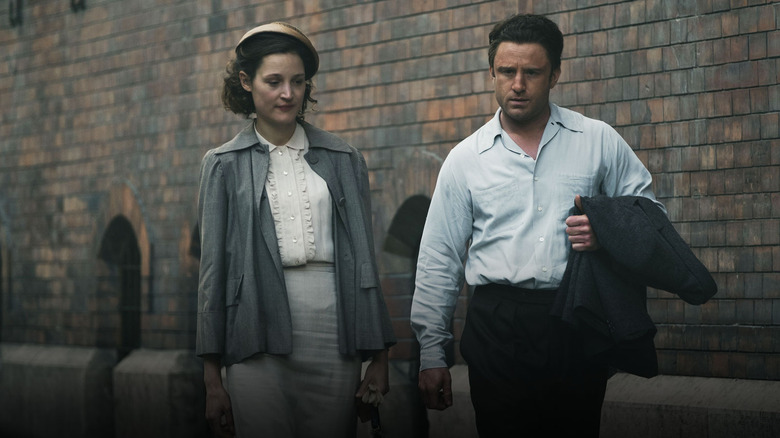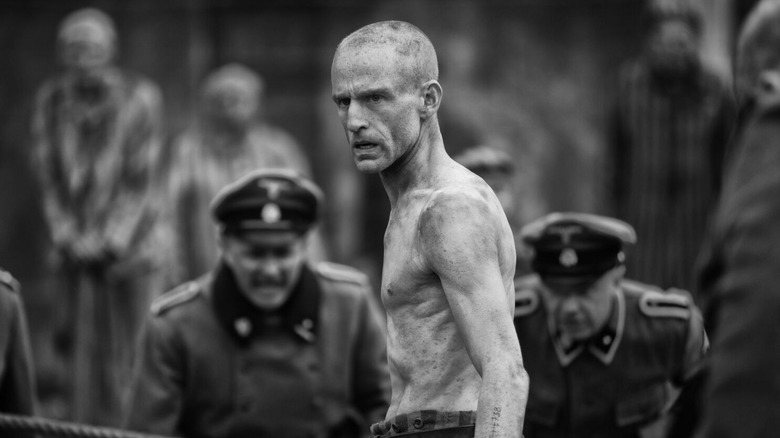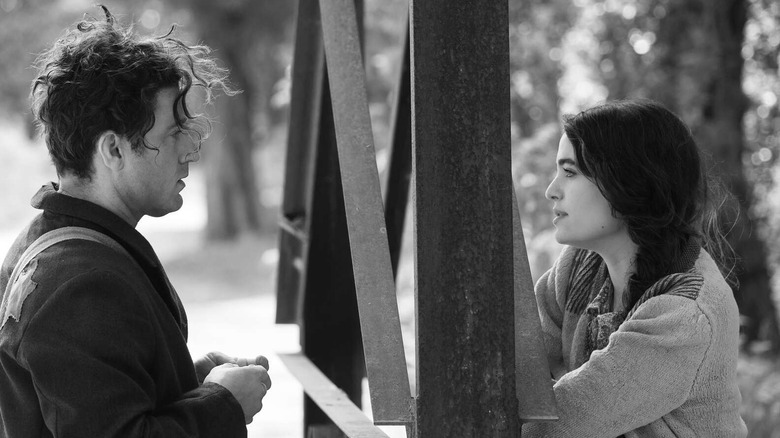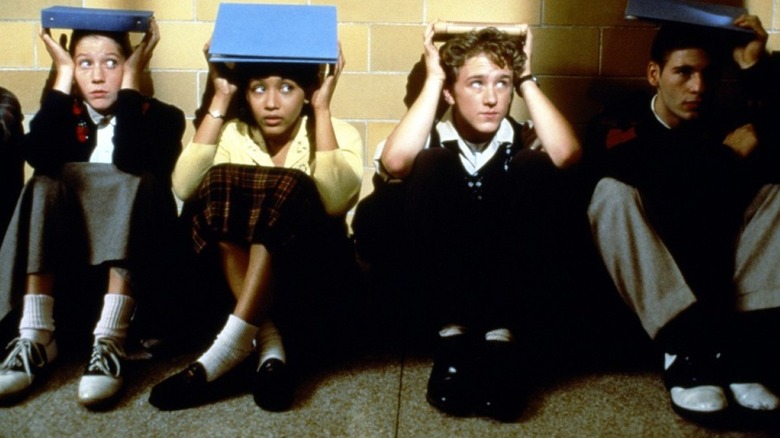Barry Levinson And Ben Foster On Telling The Harrowing Tale Of The Survivor [Interview]
Today marks the beginning of Holocaust Remembrance Day (Yom HaShoah) in Israel, and it is no coincidence that HBO Max chose this day to release their Holocaust drama "The Survivor." The film tells the remarkable true story of Harry Haft, a Polish Jew who lived through the horrors of Auschwitz during World War II by boxing fellow inmates for the amusement of his Nazi captors. Once he escapes the horrors of the camps, he sets out on a professional boxing career in post-war America, seeking to take on the great Rocky Marciano but not to win. Rather, he wants the publicity in order for his long lost love from Poland to find him ... if she is still alive.
"The Survivor" reunites Oscar-winning director Barry Levinson ("Rain Man," "Good Morning Vietnam") with his "Liberty Heights" star Ben Foster ("Hell or High Water," "Lone Survivor") over 20 years after they first collaborated. It is also a haunting but ultimately triumphant film about overcoming trauma in the face of true evil. We had the chance to speak with both Levinson and Foster about taking on such a weighty subject as well as the legacy of 1999's "Liberty Heights."
With a screenplay by Justine Juel Gillmer ("Halo," "The Wheel of Time"), "The Survivor" also stars Vicky Krieps, Billy Magnussen, Peter Sarsgaard, John Leguizamo, and Danny DeVito.
'Hours and hours of testimonies'
How did the Shoah Foundation help both of you prepare to tell Harry's story?
Ben Foster: Well, we had access to their library and the testimonies. A peripheral way of corkscrewing into the material was just listening to testimonies, hours and hours of testimonies. We were guided by them. There couldn't be a more credible foundation to help us stay focused and respectful.
Barry Levinson: And you'd ask questions. "What about ... ? What would that ... ?" Those type of things where they can provide sometimes small moments. I had to ask, and sometimes you might hear an answer that completely surprised you. I can't remember the specifics of it anymore, because you make a movie two-and-a-half years ago and then all of the sudden you're getting ready to come out. We couldn't show it to anybody because the pandemic hit, and here we are, so some things are becoming somewhat vague in my mind. But they were helpful in a number of ways, certainly in the testimony and also providing historical information.
'Harry Haft is basically dealing with Post Traumatic Stress Disorder'
Barry, you actually had a seminal experience of having an uncle named Simcha visit your home as a child experiencing PTSD symptoms as a Holocaust survivor. That was your gateway to connect to the material, correct?
Levinson: Yes, because you're seeing a man who came from the camps at the age of five, not knowing anything. That's where he's coming from. This guy showed up and turned out to be my grandmother's brother. I never knew she had a brother, she never spoke about the brother. He was staying with us for several weeks, and they put them in my bedroom in a cot on the other side of the room. The first night I woke up to him thrashing in bed, carrying on in a language I never heard. You knew something's wrong, and then he'd fall asleep. It went on night after night after night. Something was happening in the middle of the night, and then ultimately he moved on and no one ever talked about any of that. They may have had private discussions, but certainly not while I was in the room. I never found out until I was 16 years old when I was talking to my mother and then she said, "You know Simcha when he was in the concentration camp ... " I immediately flashed back, "Well, that's what those nightmares must have been."
That stayed in my head until I read this script and I thought, "Wait a minute, Harry Haft is basically dealing with Post Traumatic Stress Disorder." That's what we call it now. An event ends, but it doesn't just end. The physical aspects of it end, but the mental aspects don't go away. For the soldiers we now see that these things are there. It's not like, "Oh, the Second World War is over, everything's better." "Vietnam is gone, everything is better." For some people that haunts them, and so that's the journey of Harry Haft: haunted by that, then ultimately having to get on with life and to become a real survivor.
A big chunk of this movie is set in New York City, specifically around the same era as your Baltimore movies. How does recreating post-war New York differ from recreating post-war Baltimore?
Levinson: Aside from the fact that they look very different. The focus is how do you make it look credible? How do you go about that? I don't know anything other than that's what you do, you want to make sure you know where you are. The fact is that he was over there in that part near Coney Island and all around it. That allowed us to be able to find period buildings. We did have to do some real CGI work for the boardwalk to make certain things and the crowds that you can see all through the beaches. We had to do a lot of CGI work, take out buildings, fix things, etc. Make certain things look a little better than they actually are right now in terms of color palettes and all that. Some of that work has to be done for it, but that's part of the territory. You can't have the camps look real and somehow the neighborhoods that he is involved in look fake in the late '40s, early '50s. You've got to find a way to somehow bring credibility to it because you don't want to undermine your film in terms of character performances or the story.
'I don't know where I took a wrong turn'
You guys first worked together on a wonderful, criminally underrated movie called "Liberty Heights." What was it like reuniting over two decades later, and how had you both changed?
Levinson: How have we both changed? That's a hard one to answer. To work together again was great because here he was playing as a teenager, and now we're 20 years later and it's great to see the development of Ben from then to now. I knew then, I mean ... You're always guessing when you cast, but as "Liberty Heights" went on, the more I kept thinking, "Wait, this kid is really good. This kid is really good." So it was great. Now 20 years later, we make another movie.
Foster: For me it was absolute joy. Barry shaped me. It's was my first film and his approach was Barry's approach, and I've taken that into every job since. That there's a liveliness and a freedom and a focus and a play. That is so rare when working with directors. So yeah, getting to do this was a huge, huge, deep joy.
Not only was "Liberty Heights" your first lead role in a film, but also — to my knowledge — one of the only movies where you really get to play a laid back character. Since then you tend to take a lot of dark, intense parts, but Ben Kurtzman feels very different from a lot of what came later.
Foster: Well, it was the first film and I don't know where I took a wrong turn. [Laughs] I know I'd much prefer to laugh, but you take the work when it shows up and they keep putting me in these terrible places doing terrible things, suffering ... get me back to Balmer!
"The Survivor" is now streaming on HBO Max.



